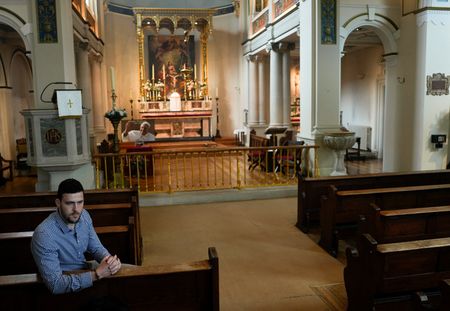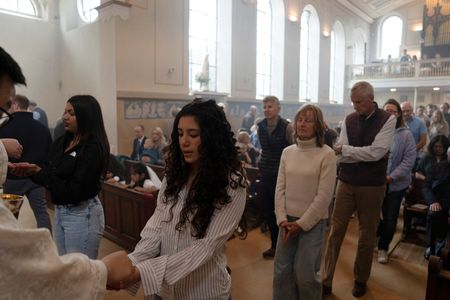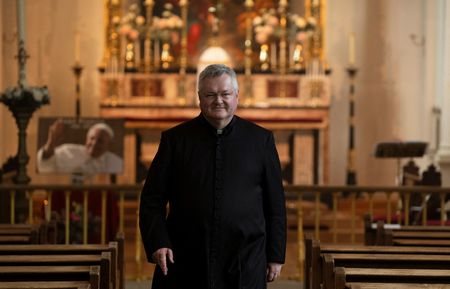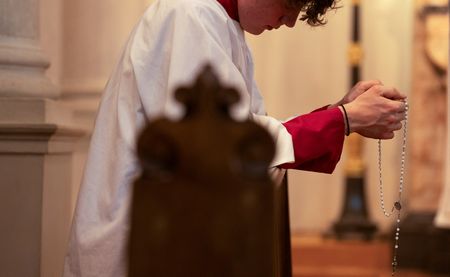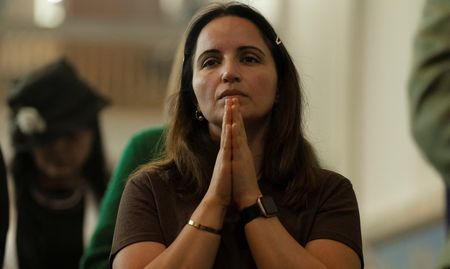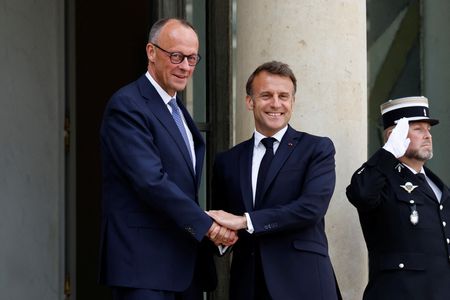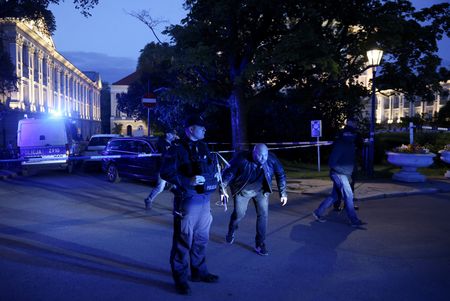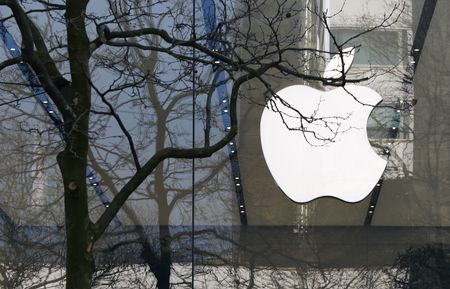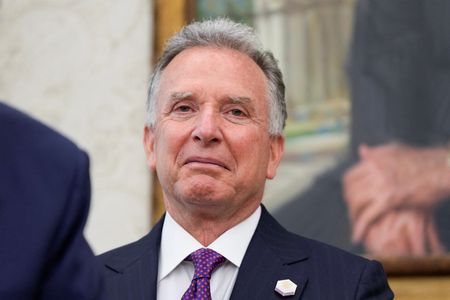By Muvija M and Sarah Young
LONDON (Reuters) – Twenty-three-year-old Joshua Steel found a “great sense of peace” that he couldn’t find anywhere else when he started attending Catholic Mass in Britain.
Twenty-six-year-old Dan Williamson was driven to convert to the faith by an “ache” he had for something “deeper and ancient and more rich”.
Both are among a growing number of men aged 18-34 who are going to church in Britain compared with before the COVID pandemic, upending the long-held tenet that Christianity was in generational decline in Western nations like Britain.
As the cardinals gather to vote for Pope Francis’s successor on May 7, as they have for centuries, it is the traditions and rituals of the Catholic Church, combined with a longing for connection and faith, which seem to hold an appeal for younger adults in Britain, and men in particular.
“I was looking for meaning in life,” Steel said after Mass ended at St. Elizabeth of Portugal church in southwest London on Sunday, as the smell of incense hung in the air.
An Australian who moved to Britain in 2023, Steel was born into a Catholic family but never went to church, until he started trying to fill the “hole” he felt in his life.
“I found Christ,” he said. “I found a great sense of peace that I can’t find anywhere else.”
The rising church attendance in England and Wales by younger people was illustrated in a Bible Society and YouGov report called the Quiet Revival in April, which surveyed 13,146 adults in November 2024.
It found that Christians who go to church at least once a month make up 12% of the total population, up from 8% in 2018. For people aged 18-24, the proportion had risen to 16% from just 4% in 2018, making this age group the second most likely to go to church regularly after those aged 65 and over. The increase has been particularly pronounced among younger men, 21% of whom say they are regular churchgoers versus 12% of women aged 18-24.
And almost 500 years after King Henry VIII’s split with Rome to create the Church of England, Catholicism is now more popular than Anglicanism in the 18-34 age group of churchgoers, with 41% identifying as Catholic, up from 22% in 2018, and compared with the 20% who say they are Anglican, down from 30%.
TRADITION IN VOLATILE TIMES
According to the 20 people Reuters spoke to for this story, including Catholic converts, faith leaders and academics, reasons cited included the destabilising impact of the pandemic, a desire for ancient tradition in volatile times, a wish to volunteer, and a disillusionment with the modern world.
The report also said those who attended church were more satisfied and had a greater feeling of connection to community – an appealing prospect in the digital age when complaints about anxiety and mental health problems are surging.
Williamson, who converted from Anglicanism to Catholicism, and has struggled with anxiety, said he had found reassurance in a connection to the past.
“It is grounded in this thing which is so much bigger than ourselves,” he said. “We’re probably the first generation to try and live without God, and I think we’re slowly just saying that doesn’t work.”
David Stewart, a priest in Edinburgh, started a young adults’ Catholic group with about 30 people three years ago. He now has 100 regular young attendees at Sunday evening Mass, and over 200 people in a WhatsApp group.
Stewart said most of those coming to his Edinburgh group had no background in religion and about 60-80% of them were men, with many working in software and financial services.
“They’re looking for something deeper,” he said.
The St. Elizabeth church in London has seen similar growth in its youth wing after churchgoer Georgia Clarke, 28, launched a Zoom call to help a handful of teenagers battling isolation during the pandemic. Its youth group is now 100 strong.
She said she had tried to reach people in the same “humble” way Pope Francis had, shunning the more traditional focus on preparing for the sacraments of communion and confirmation, in favour of informal conversations.
“It’s inspired many of us, including myself, in how we can be more outward looking,” she said.
Aidan Geboers, 29, a regular at a Catholic church in Mayfair, central London, who works in the banking industry, said he enjoyed the sense of belonging and community.
“It is really nice to not be in front of a screen, be around people, you know, just expressing faith,” he said.
SPARKING A DEBATE
The apparent growth in the number of young people going to church in Britain has sparked a debate about its appeal.
According to the census the number of people in Britain describing themselves as Christian dropped to 46% of the population in England and Wales, from 59% in 2011. But academics said the smaller number that remained were more committed to their faith, and attending church.
Unlike the United States, politicians and public figures in Britain have generally been more reticent about religion, with an aide to Tony Blair once saying “We don’t do God” when an interviewer asked about the former prime minister’s faith. Blair converted to Catholicism in 2007.
That has changed however, with the rapper Stormzy and Arsenal footballer Bukayo Saka, just two prominent young Britons amongst many who are open about their Christian faith and share their beliefs on social media.
Rising immigration from more religious societies has also increased the public discussion on faith, with young Muslims talking both online and off about the joy of Ramadan.
And faith leaders say social media has provided young people with an easy entry into religion. Britain’s biggest Christian publisher SPCK said 310,458 bibles were sold in the UK in 2024, up from 258,391 in 2023, and 194,013 in 2018.
The Catholic Church says it has grown globally, with the Catholic population rising by around 1% to 1.406 billion between 2022 and 2023, with the U.S. Vice President JD Vance one of the most high-profile after he converted in 2019.
Stewart in Edinburgh said for some, attendance marked a rejection of the culture of toxic masculinity and instead opting for “fellowship, tolerance and service of others”.
Tim Hutchings, Associate Professor of Religious Ethics, University of Nottingham, said the pandemic could have given a boost given the social isolation faced by youngsters at a formative age, and the growth could also be seen as a possible backlash against progressive politics and decline of traditional roles.
“Maybe as part of that, young people, and particularly young men are saying, let’s get into a really conservative, anti-feminist institution,” he said.
Pope Francis appointed more women than ever before to top Vatican positions but disappointed some advocates for greater roles for women in the wider Church by putting off the question of allowing women to be ordained as clergy.
For the priest at St Elizabeth’s, Father Stephen Langridge, the draw was the ancient traditions which are “consoling in a world where everything seems to be transient, nothing seems to be lasting.”
“Are we seeing a seismic shift?” he asked. “I don’t know. But what we are seeing is a significant shift.”
(Editing by Kate Holton and Alexandra Hudson)

